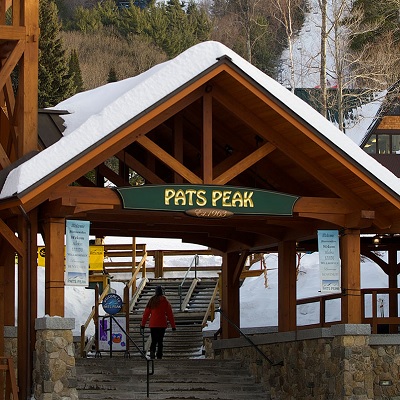Destimetrics - Lodging At Western Mountain Destinations Poised For Summer Rate And Revenue Records

The focus for western mountain destinations is now squarely on the summer season as these resort communities are flexing some impressive muscle as they mount their recovery against last summer’s pandemic-limited visitor season. As of May 31, a robust rebound is well underway according to the most recent aggregated results released yesterday by DestiMetrics,* the Business Intelligence division of Inntopia in their monthly Market Briefing. The report includes data collected from 18 mountain destinations in eight western states. The aggregated results affirm that these communities are posting the expected huge gains compared to last year, and they are also showing significant strides compared to two years ago at the same time.
May results
Actual occupancy for the month of May in a year-over-year comparison to last May was up a staggering, but not unexpected, 512.8 percent compared to the previous May when many destinations and lodging properties were mostly shuttered in the midst of the initial pandemic lockdown. The Average Daily Rate (ADR) for the month was up 64.2 percent and the result of the huge increase in rate and occupancy delivered a dazzling 931.8 percent in revenues for the month of May. But these astronomical gains are based on a very grim month in May 2020. A more relevant comparison is this May (2021) compared to the more typical May activity of two years ago. While actual occupancy this May was down 8.2 percent compared to the same time two years ago, that decrease was more than compensated for as ADR was up a healthy 21.6 percent compared to two years ago. The result is an aggregated 13.4 percent increase in May revenues compared to the pre-pandemic month of May 2019.
Summer making strides as pent-up demand still going strong
The six-month summer season that extends from May through October is building in strength. As of May 31, occupancy for the full season is up a substantial 166 percent compared to Summer 2020 with gains in all six months. The ADR is up a solid 25.3 percent to deliver an exceptional 234.7 percent year-over-year gain in aggregated revenue.
When contrasted with the pre-pandemic summer of 2019, the results are far less dramatic but very positive considering the upheaval of the past 16 months. On-the-books occupancy is up a slight 1.6 percent compared to two years ago with declines in May, June, and July compared to those months in 2019. In sharp contrast to the moderate occupancy growth, ADR is up a substantial 30.7 percent compared to two summers ago and that increase more than offsets the moderate occupancy growth to show a current revenue gain of 33.1 percent compared to this same time two years ago.
“The comparisons to last summer when the pandemic was wreaking havoc on summer vacation plans certainly appears dazzling, but they do not represent a realistic view of how lodging properties are performing in the long-term,” explained Tom Foley, senior vice president for Business Operations and Analytics for Inntopia. “When we make the comparisons to two years ago, we see that the mountain destinations showed impressive resilience as they adapted to the ever-changing circumstances. At the same time, mountain visitors are exhibiting their commitment and loyalty to these destinations as they are returning at ever-growing pre-pandemic numbers and showing little reluctance or resistance about significantly higher rates.”
Economic measurements
The Dow Jones Industrial Average (DJIA) continued its meteoric rise with a 1.9 percent gain during the month to post another all-time record for a monthly closing. This is the fourth consecutive monthly gain and the ninth month-over-month gain in the past 12 months. It is 36 percent higher than it was in May 2020 after suffering major losses in the previous February, March, and April and investors are encouraged by growing vaccination rates and increased economic activity. The Consumer Confidence Index (CCI) was essentially unchanged in May by dipping a scant 0.3 points to 117.2. Analysts suggest that while consumers seem assured about the immediate economic future, their outlook for the short-term declined somewhat suggesting the potential for a dip later in the summer.
The national Unemployment Rate dropped 0.3 percent during April to take it from 6.1 to 5.8 percent in May as employers added 559,000 new jobs. Although better than the anemic job growth in April, the number fell short of expectations for the second consecutive month. In addition to the new jobs, the decline in the unemployment rate can also be attributed to discouraged workers leaving the workforce as they halted their job search. Although stagnant in recent weeks, the 5.8 percent unemployment rate is dramatically better than May 2020 when it was at 13.2 percent.
Keeping an eye on
- Pent-up demand for recreational travel to the mountains remains very high as on-the-books occupancy for the months of July, August, and September continues to pace well ahead of two years ago at this time.
- A new high bar is currently being set for summer daily rates. While some rate adjustments were made last summer to attract guests, the ADR is up a robust 25.3 percent compared to last summer but more remarkably, is up 30.7 percent compared to the summer of 2019.
- The lead-time for bookings is growing and is longer than it was prior to the onset of the pandemic. As COVID-19 cases have declined dramatically and vaccinations have increased, consumers have more confidence in booking reservations that they can keep. Along with increased competition requiring earlier commitment to bookings, the extended lead times have contributed significantly to the strong foundation for occupancy in Summer 2021.
- Cancellations remain higher than normal. Although booking volume is higher this summer than at any time in the past, cancellations are also being processed at a notably higher rate than prior to the pandemic.
More flexible cancellation policies introduced in the past year to help reassure cautious consumers may be part of the reason.
“Higher daily rates represent an opportunity for properties to regain lost revenue from the last year, although as the recovery continues, staffing issues are creating challenges for some providers to meet the expectations of their guests--this is true for most travel-related destination services,” commented Foley. “And while room rates are definitely pushing towards a new summer record, sustaining them in the long run is less certain. As pent-up demand is satisfied, it is possible that the high rates this year will be the anomaly of 2021, much the way lower rates were an anomaly last summer in the midst of the pandemic restrictions,” he concluded.













